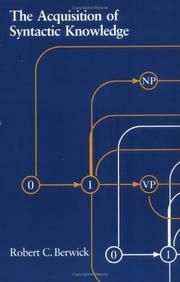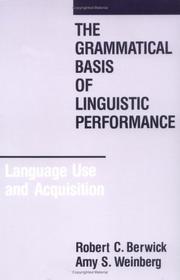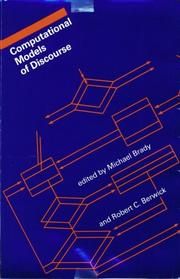| Listing 1 - 10 of 12 | << page >> |
Sort by
|

ISBN: 0262022265 9780262022262 Year: 1985 Publisher: Cambridge, MA : M.I.T. Press,
Abstract | Keywords | Export | Availability | Bookmark
 Loading...
Loading...Choose an application
- Reference Manager
- EndNote
- RefWorks (Direct export to RefWorks)
Mathematical linguistics --- Artificial intelligence. Robotics. Simulation. Graphics --- Grammar --- Artificial intelligence --- Computational linguistics --- Language acquisition --- Learning --- Intelligence artificielle --- Linguistique informatique --- Langage --- Apprentissage --- Mathematical models --- Acquisition --- Modèles mathématiques --- 802.0-07 --- -681.3*I26 --- 681.3*I27 --- Learning process --- Comprehension --- Education --- Acquisition of language --- Developmental linguistics --- Developmental psycholinguistics --- Language and languages --- Language development in children --- Psycholinguistics, Developmental --- Interpersonal communication in children --- Psycholinguistics --- Automatic language processing --- Language data processing --- Linguistics --- Natural language processing (Linguistics) --- Applied linguistics --- Cross-language information retrieval --- Multilingual computing --- AI (Artificial intelligence) --- Artificial thinking --- Electronic brains --- Intellectronics --- Intelligence, Artificial --- Intelligent machines --- Machine intelligence --- Thinking, Artificial --- Bionics --- Cognitive science --- Digital computer simulation --- Electronic data processing --- Logic machines --- Machine theory --- Self-organizing systems --- Simulation methods --- Fifth generation computers --- Neural computers --- Engels: taalonderwijs; taalverwerving --- Learning: analogies; concept learning; induction; knowledge acquisition; language acquisition; parameter learning (Artificial intelligence)--See also {681.3*K32} --- Natural language processing: language generation; language models; language parsing and understanding; machine translation; speech recognition and under-standing; text analysis (Artificial intelligence) --- Data processing --- Artificial intelligence. --- Computational linguistics. --- Language acquisition. --- Mathematical models. --- 681.3*I27 Natural language processing: language generation; language models; language parsing and understanding; machine translation; speech recognition and under-standing; text analysis (Artificial intelligence) --- 681.3*I26 Learning: analogies; concept learning; induction; knowledge acquisition; language acquisition; parameter learning (Artificial intelligence)--See also {681.3*K32} --- 802.0-07 Engels: taalonderwijs; taalverwerving --- Modèles mathématiques --- 681.3*I26

ISBN: 9780262268394 0585368910 9780585368917 0262268396 9780262022262 0262022265 Year: 1985 Publisher: Cambridge, Mass. : MIT Press,
Abstract | Keywords | Export | Availability | Bookmark
 Loading...
Loading...Choose an application
- Reference Manager
- EndNote
- RefWorks (Direct export to RefWorks)
"This landmark work in computational linguistics is of great importance both theoretically and practically because it shows that much of English grammar can be learned by a simple program. The Acquisition of Syntactic Knowledge investigates the central questions of human and machine cognition: How do people learn language? How can we get a machine to learn language? It first presents an explicit computational model of language acquisition which can actually learn rules of English syntax given a sequence of grammatical, but otherwise unprepared, sentences. It shows that natural languages are designed to be easily learned and easily processed-an exciting breakthrough from the point of view of artificial intelligence and the design of expert systems because it shows how extensive knowledge might be acquired automatically, without outside intervention. Computationally, the book demonstrates how constraints that may be reasonably assumed to aid sentence processing also aid language acquisition. Chapters in the book's second part apply computational methods to the general problem of developmental growth, particularly the thorny problem of the interaction between innate genetic endowment and environmental input, with the intent of uncovering the constraints on the acquisition of syntactic knowledge. A number of "mini-theories" of learning are incorporated in this study of syntax with results that should appeal to a wide range of scholarly interests. These include how lexical categories, phonological rule systems, and phrase structure rules are learned; the role of semantic-syntactic interaction in language acquisition; how a "parameter setting" model may be formalized as a learning procedure; how multiple constraints (from syntax, thematic knowledge, or phrase structure) interact to aid acquisition; how transformational-type rules may be learned; and, the role of lexical ambiguity in language acquisition. Robert Berwick is an assistant professor in the Department of Electrical Engineering and Computer Science at MIT. The Acquisition of Syntactic Knowledge is sixteenth in the Artificial Intelligence Series, edited by Patrick Winston and Michael Brady."
Computational linguistics. --- Language acquisition. --- Learning --- Artificial intelligence. --- Mathematical models. --- AI (Artificial intelligence) --- Artificial thinking --- Electronic brains --- Intellectronics --- Intelligence, Artificial --- Intelligent machines --- Machine intelligence --- Thinking, Artificial --- Bionics --- Cognitive science --- Digital computer simulation --- Electronic data processing --- Logic machines --- Machine theory --- Self-organizing systems --- Simulation methods --- Fifth generation computers --- Neural computers --- Acquisition of language --- Developmental linguistics --- Developmental psycholinguistics --- Language and languages --- Language development in children --- Psycholinguistics, Developmental --- Interpersonal communication in children --- Psycholinguistics --- Automatic language processing --- Language data processing --- Linguistics --- Natural language processing (Linguistics) --- Applied linguistics --- Cross-language information retrieval --- Mathematical linguistics --- Multilingual computing --- Acquisition --- Data processing --- Artificial intelligence --- Computational linguistics --- Language acquisition --- Learning - Mathematical models --- Grammatical aspects --- COMPUTER SCIENCE/General
Book
ISBN: 9780262533492 9780262034241 Year: 2016 Publisher: Cambridge The MIT Press
Abstract | Keywords | Export | Availability | Bookmark
 Loading...
Loading...Choose an application
- Reference Manager
- EndNote
- RefWorks (Direct export to RefWorks)
Biolinguistics. --- Minimalisme (Linguistique) --- Biolinguistique --- Language acquisition --- Human evolution --- Minimalist theory (Linguistics) --- Psycholinguistics. --- Langage --- Homme --- Psycholinguistique --- Psychological aspects. --- Acquisition --- Aspect psychologique --- Evolution --- Language, Psychology of --- Language and languages --- Psychology of language --- Speech --- Linguistics --- Psychology --- Thought and thinking --- Biology --- Generative grammar --- Evolution (Biology) --- Physical anthropology --- Evolutionary psychology --- Human beings --- Acquisition of language --- Developmental linguistics --- Developmental psycholinguistics --- Language development in children --- Psycholinguistics, Developmental --- Interpersonal communication in children --- Psycholinguistics --- Psychological aspects --- Origin --- Biolinguistics
Book
ISBN: 0262034247 0262533499 026233335X 9780262333351 9780262333368 0262333368 9780262034241 9780262533492 Year: 2016 Publisher: Cambridge, Massachusetts : The MIT Press,
Abstract | Keywords | Export | Availability | Bookmark
 Loading...
Loading...Choose an application
- Reference Manager
- EndNote
- RefWorks (Direct export to RefWorks)
"We are born crying, but those cries signal the first stirring of language. Within a year or so, infants master the sound system of their language; a few years after that, they are engaging in conversations. This remarkable, species-specific ability to acquire any human language--'the language faculty'--raises important biological questions about language, including how it has evolved. This book by two distinguished scholars--a computer scientist and a linguist--addresses the enduring question of the evolution of language. Robert Berwick and Noam Chomsky explain that until recently the evolutionary question could not be properly posed, because we did not have a clear idea of how to define 'language' and therefore what it was that had evolved. But since the Minimalist Program, developed by Chomsky and others, we know the key ingredients of language and can put together an account of the evolution of human language and what distinguishes us from all other animals. Berwick and Chomsky discuss the biolinguistic perspective on language, which views language as a particular object of the biological world; the computational efficiency of language as a system of thought and understanding; the tension between Darwin's idea of gradual change and our contemporary understanding about evolutionary change and language; and evidence from nonhuman animals, in particular vocal learning in songbirds"--MIT CogNet.
Language acquisition --- Human evolution --- Minimalist theory (Linguistics) --- Biolinguistics. --- Psycholinguistics. --- Language, Psychology of --- Language and languages --- Psychology of language --- Speech --- Linguistics --- Psychology --- Thought and thinking --- Biology --- Generative grammar --- Evolution (Biology) --- Physical anthropology --- Evolutionary psychology --- Human beings --- Acquisition of language --- Developmental linguistics --- Developmental psycholinguistics --- Language development in children --- Psycholinguistics, Developmental --- Interpersonal communication in children --- Psycholinguistics --- Psychological aspects. --- Psychological aspects --- Origin --- Acquisition --- LINGUISTICS & LANGUAGE/General --- BIOMEDICAL SCIENCES/Evolution
Book
ISBN: 0262021927 Year: 1984 Volume: 11 Publisher: Cambridge MIT press
Abstract | Keywords | Export | Availability | Bookmark
 Loading...
Loading...Choose an application
- Reference Manager
- EndNote
- RefWorks (Direct export to RefWorks)
Psycholinguistics --- Grammar --- Generative grammar --- Computational linguistics --- Language acquisition --- Grammaire générative --- Linguistique informatique --- Langage --- Acquisition --- 801.56 --- Acquisition of language --- Developmental linguistics --- Developmental psycholinguistics --- Language and languages --- Language development in children --- Psycholinguistics, Developmental --- Interpersonal communication in children --- Grammar, Comparative and general --- Grammar, Generative --- Grammar, Transformational --- Grammar, Transformational generative --- Transformational generative grammar --- Transformational grammar --- Automatic language processing --- Language data processing --- Linguistics --- Natural language processing (Linguistics) --- Applied linguistics --- Cross-language information retrieval --- Mathematical linguistics --- Multilingual computing --- Syntaxis. Semantiek --- Derivation --- Data processing --- 801.56 Syntaxis. Semantiek --- Grammaire générative

ISBN: 0262521105 Year: 1984 Publisher: Cambridge, MA : M.I.T. Press,
Abstract | Keywords | Export | Availability | Bookmark
 Loading...
Loading...Choose an application
- Reference Manager
- EndNote
- RefWorks (Direct export to RefWorks)
Computational linguistics. --- Generative grammar. --- Language acquisition.

ISBN: 9780262255806 0585363102 9780585363103 0262255804 9780262523912 0262021838 9780262021838 Year: 1983 Publisher: Cambridge, MA : M.I.T. Press,
Abstract | Keywords | Export | Availability | Bookmark
 Loading...
Loading...Choose an application
- Reference Manager
- EndNote
- RefWorks (Direct export to RefWorks)
Annotation
Artificial intelligence. Robotics. Simulation. Graphics --- Mathematical linguistics --- Artificial intelligence. --- Computational linguistics --- Speech processing systems. --- 681.3*H31 --- 681.3*I27 --- 681.3*J5 --- AI (Artificial intelligence) --- Artificial thinking --- Electronic brains --- Intellectronics --- Intelligence, Artificial --- Intelligent machines --- Machine intelligence --- Thinking, Artificial --- Bionics --- Cognitive science --- Digital computer simulation --- Electronic data processing --- Logic machines --- Machine theory --- Self-organizing systems --- Simulation methods --- Fifth generation computers --- Neural computers --- 681.3*I27 Natural language processing: language generation; language models; language parsing and understanding; machine translation; speech recognition and under-standing; text analysis (Artificial intelligence) --- Natural language processing: language generation; language models; language parsing and understanding; machine translation; speech recognition and under-standing; text analysis (Artificial intelligence) --- 681.3*H31 Content analysis and indexing: abstracting methods; dictionaries; indexing methods; linguistic processing; thesauruses (Information storage and retrieval) --- Content analysis and indexing: abstracting methods; dictionaries; indexing methods; linguistic processing; thesauruses (Information storage and retrieval) --- Electronic systems --- Information theory --- Modulation theory --- Oral communication --- Speech --- Telecommunication --- Singing voice synthesizers --- Automatic language processing --- Language and languages --- Language data processing --- Linguistics --- Natural language processing (Linguistics) --- Applied linguistics --- Cross-language information retrieval --- Multilingual computing --- Geesteswetenschappen (computertoepassingen) --- Data processing --- Computational linguistics. --- Intelligence artificielle --- Linguistique informatique --- Traitement automatique de la parole --- Artificial intelligence --- Speech processing systems --- Data processing. --- Man --- Natural language communication with digital computer systems --- COMPUTER SCIENCE/General
Book
ISBN: 9780198795087 9780198795094 0198795092 0198795084 0191836451 0192514296 Year: 2019 Publisher: Oxford Oxford University Press
Abstract | Keywords | Export | Availability | Bookmark
 Loading...
Loading...Choose an application
- Reference Manager
- EndNote
- RefWorks (Direct export to RefWorks)
This book is the first dedicated to linguistic parsing - the processing of natural language according to the rules of a formal grammar - in the Minimalist Program. While Minimalism has been at the forefront of generative grammar for several decades, it often remains inaccessible to computer scientists and others in adjacent fields. This volume makes connections with standard computational architectures, provides efficient implementations of some fundamentalminimalist accounts of syntax, explores implementations of recent theoretical proposals, and explores correlations between posited structures and measures of neural activity during human language comprehension. These studies will appeal to graduate students and researchers in formal syntax, computationallinguistics, psycholinguistics, and computer science.
Grammar --- Mathematical linguistics --- Grammar, Comparative and general --- Parsing --- Parsing (Grammar) --- Syntax --- Linguistics --- Philology
Book
ISBN: 0198736711 1299956467 0191635634 0191745049 0199590338 9780191635632 9780191745041 9781299956469 9780199590339 Year: 2013 Publisher: Oxford : Oxford University Press,
Abstract | Keywords | Export | Availability | Bookmark
 Loading...
Loading...Choose an application
- Reference Manager
- EndNote
- RefWorks (Direct export to RefWorks)
This text addresses one of the most famous and controversial arguments in the study of language and mind, the Poverty of the Stimulus. Internationally recognised scholars consider afresh the issues surrounding this argument and discuss its relation to the process of language acquisition.
Language acquisition --- Language acquisition. --- Sociolinguistics. --- Language and languages --- Language and society --- Society and language --- Sociology of language --- Language and culture --- Linguistics --- Sociology --- Integrational linguistics (Oxford school) --- Acquisition of language --- Developmental linguistics --- Developmental psycholinguistics --- Language development in children --- Psycholinguistics, Developmental --- Interpersonal communication in children --- Psycholinguistics --- Social aspects. --- Social aspects --- Sociological aspects --- Acquisition --- Sociolinguistics
Book
Year: 1990 Publisher: [Etats-Unis] : Association for computational linguistics,
Abstract | Keywords | Export | Availability | Bookmark
 Loading...
Loading...Choose an application
- Reference Manager
- EndNote
- RefWorks (Direct export to RefWorks)
| Listing 1 - 10 of 12 | << page >> |
Sort by
|

 Search
Search Feedback
Feedback About
About Help
Help News
News